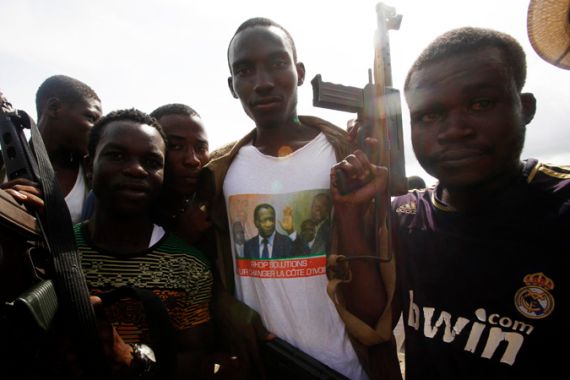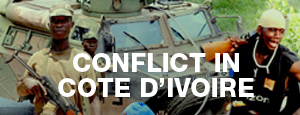UN names Ivory Coast rights probe team
Investigation to cover the violence that erupted after the disputed November 28 election.

 |
| Alain Toussaint, left, a spokesman for Gbagbo, accused France of staging a ‘coup’ against his leader [Reuters] |
The United Nations has named a team of human rights experts who are to investigate alleged rights abuses in Ivory Coast.
The UN Human Rights Council said on Tuesday that the team would be led by Vitit Muntabhorn, a Thai law professor who previously served as the special rapporteur on human rights in North Korea.
The move follows the capture of Laurent Gbagbo, whose refusal to quit the presidency after losing it led to conflict in the west African country.
The UN has reportedly uncovered 536 bodies in the west of Ivory Coast since the end of March and it is believed that a further 400 people died as a result of fighting in Abidjan, the commercial capital, even before the most recent fighting there.
Navi Pillay, the UN high commissioner for human rights, said last week that the shelling of a marketplace in Abidjan’s Abobo district and the murder of women peacefully protesting, as well as numerous other killings and abductions, may amount to crimes against humanity.
The investigation is to cover the period since the November 28, 2010 election which Gbagbo lost, according to UN-certified results.
The disputed election erupted into violence with Gbagbo and his supporters facing off against Alassane Ouattara, who has international backing as the poll winner and Ivory Coast’s president-elect.
Both sides have been accused of human rights abuses in the conflict.
But Issiaka Konate, a spokesman for Ouattara in London, has insisted that of the violence that occured in the aftermath of the election “there’s only one person responsible … and the whole world knows that it’s Mr Gbagbo”.
“Had Mr Gbagbo stepped down peacefully, so many things that happened after the election wouldn’t have happened,” he told Al Jazeera.
Calls for calm
Gbagbo was captured by Ouattara’s forces on Monday, but sporadic clashes involving heavy weapons continue to rock Abidjan.
The fighting was heard in areas largely loyal to Gbagbo, the central Plateau district and Cocody in the north, as pro-Ouattara forces tried to return the city to normalcy after 10 days of bitter street battles.
Following Gbago’s capture, Ouattara called for calm and promised a South Africa-style truth and reconciliation commission.
 |
| Click here for more special coverage |
“I call on my fellow countrymen to abstain from all forms of reprisal and violence,” he said in a speech on his TCI television, calling for “a new era of hope”.
But the Associated Press reported a spate of reprisal killings on Tuesday, and quoted a catholic priest in the port of San Pedro as saying parishioners had reported the kidnappings of dozens of young men.
Gbagbo, who is being held in Abidjan’s Golf Hotel, where Ouattara has been living since the disputed election, also spoke briefly on Ouattara’s TCI television, calling for an end to the fighting.
Jendayi Frazer, a former US assistant secretary of state for African affairs, told Al Jazeera that Ouattara’s key goal should now be to ensure Gbagbo’s supporters could be brought on side.
“He has to restore the economy quickly, and most importantly he has to reach out to Gbagbo’s supporters and try to forge the kind of political agreement that will allow the security environment to return to some sense of normalcy,” she said.
“It’s going to be hard, and that is where the role of the United Nations is going to be so important.”
In a potential boost to Ouattara’s legitimacy, army chiefs who fought for Gbagbo pledged their loyalty to him, according to TCI television.
The channel said that Philippe Mangou, Gbagbo’s former army chief of staff, as well as “all the generals of the ground, air and navy forces” had sworn their loyalty to Ouattara.
Frazer said that with Gbagbo removed from power, Ivory Coast had strong economic prospects.
“The international community is moving rapidly to remove the sanctions [against Ivory Coast] to restart economic activity there … there’s tremendous opportunity and there will be a lot of good will politically,” she told Al Jazeera.
French ‘coup’ claimed
French troops are said to have led Gbagbo’s capture and in Paris on Tuesday a spokesman for Gbagbo accused French special forces of carrying out a coup in its former colony on behalf of Ouattara.
“It was a coup d’etat which had no other aim but to gain control of the resources of Ivory Coast,” Alain Toussaint told reporters.
| The battle for Abidjan |
|
|
“Gbagbo was captured by French special forces, who took him to the Golf Hotel.”
France has repeatedly denied claims that French troops had arrested Gbagbo, insisting that they never set
foot in his compound despite having bombarded it from the air.
“Not a single French soldier set foot in his residence,” Francois Fillion, the French prime minister, told parliament.
“The priority is now reconciliation and reconstruction, it’s a victory for the rule of law, for democracy and for the United Nations mission in Ivory Coast,” he said, brushing off critics of France’s role in the conflict.
He also said that there was no reason for French forces to remain in Ivory Coast over the long term.
“Licorne has no call to remain in Ivory Coast,” he said, referring to the French force in the country.
France has 1,700 troops in Ivory Coast and there is a large French community in major Ivorian cities.
The French defence minister, Gerard Longuet, said his ministry would scale back its forces after the capture of Gbagbo to a “few hundred men” but gave no timetable.